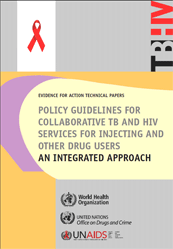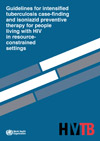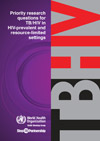Measures to reduce the burden of TB and HIV in injecting and other drug users

The publication Policy guidelines for collaborative HIV and TB services for injecting and other drug users was finalized and launched at the AIDS 2008 conference in Mexico city. Produced by WHO, the UN Office on Drugs and Crime (UNODC), and UNAIDS, the policy provides a strategic approach to reducing TB and HIV related morbidity and mortality among at risk drug users and their communities.
Visit the WHO website on HIV and injecting drug use
Read an AIDSmap article on the guidelines
Case studies of collaborative TB/HIV services for drug users in Brazil, India, Ukraine and Zanzibar
Model of Integrated HIV, TB and drug dependency care services for People who inject drugs in Ukraine
This WHO commissioned report examines the development of integrated care services for HIV, TB and drug dependency in Ukraine, as part of the country’s ongoing response to the HIV epidemic. The report offers practical insight and real world models for programme managers, civil society and other stakeholders considering the implementation of collaborative TB/HIV services for injecting drug users in similar settings. Click below to access the report.
Making integrated TB and HIV services available to drug users as part of the harm reduction package
The 20th international conference on harm reduction took place in Bangkok from 20-23 April, 2009, attracting some 1000 delegates from 80 countries. WHO organized a session on Collaborative TB and HIV services for Drug users where the WHO, UNODC and UNAIDS joint policy guide on collaborative HIV and TB services for injecting and other drug users was presented. WHO also organized a TB skills building workshop to share country experiences. Participants learned of the challenges such as symptom screening for TB in drug users, and the difficulties of continuing TB treatment services when clients are placed in jail and how these were overcome.
Organized by the International Harm Reduction Association (IHRA), the conference's theme was on human rights, underscoring the necessity of injecting drug users' universal access to the comprehensive harm reduction package. This includes clean needles and syringes, substitution therapy, condoms, HIV testing and counselling and provision of TB treatment and prevention services. Laws criminalizing the possession of injecting equipment or substitution therapy are major barriers in responding to TB and HIV treatment of drug users, as the fear of criminal measures and prosecution force many drug users underground.
Drug users account for 10% of the HIV epidemic globally and up to 30% outside sub-Saharan Africa. Drug users even without HIV have high rates of TB, and around 20% of them have HIV globally. TB/HIV morbidity and mortality in drug users is made worse by poor treatment access, lower tuberculosis treatment completion rates, and exposure to prison settings. Ensuring harm reduction measures in and out of prison and integrating these with TB and HIV services is critical to the health of drug users and to the fight against the TB and HIV epidemic.
This is the first time that TB has been featured at a major session at the IHRA conference, and it is envisaged to be the beginning of increased TB/HIV advocacy and training activities linked to harm reduction in the next period.




 Intensive case finding and isoniazid preventive therapy guidelines, 2010
Intensive case finding and isoniazid preventive therapy guidelines, 2010
 Priority research questions for TB/HIV in HIV-prevalent and resource-limited settings, 2010
Priority research questions for TB/HIV in HIV-prevalent and resource-limited settings, 2010